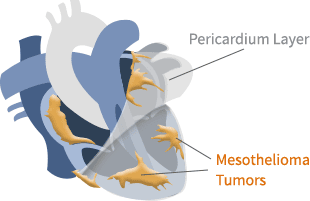Pericardial Mesothelioma | Rare Type of Mesothelioma
How Is Pericardial Mesothelioma Unique?
As the least common of the three major types of cancer caused by asbestos, malignant pericardial mesothelioma only accounts for about 1 – 2 percent of all mesothelioma cases. Pericardial mesothelioma is different from other types in the following ways:

Calm mind brings inner strength and self-confidence, so that's very important for good health.
- Location:
- Pericardial mesothelioma is located in the lining of the heart, known as the pericardium.
- Symptoms:
- As the disease affects the heart, the main symptoms affect cardiovascular operation, including chest pain, fluid buildup in the heart (pericardial effusion), heart murmurs, arrhythmia, and pulse variance.
- Treatment:
- The standard surgical therapy for pericardial mesothelioma is the removal of the pericardiectomy or removal of the lining of the heart. A pericardiocentesis can also be performed to remove fluid and relieve pressure on the heart.
- Survival:
- Due to its rarity, the prognosis for pericardial mesothelioma is extremely poor, with about half of patients living six months or more.

What is the Prognosis for Pericardial Mesothelioma?
The prognosis for all mesothelioma types is poor; however, the prognosis for pericardial mesothelioma is even worse than other forms of cancer. The median survival period for peritoneal mesothelioma is 6 months, and only one pericardial mesothelioma patient is known to have survived longer than five years.
Part of the reason for the dire prognosis is the location of the tumors so near the heart. There is a lot of opportunity for complications, and it can be difficult for patients to overcome the stress involved with surgery and other treatments for the disease.
The biggest factors affecting the prognosis of pericardial mesothelioma patients are:
- Tumor staging and size
- Cell type (histopathology)
- Gender of the patient
- Whether cancer has metastasized (spread)

What Treatments are Available for Pleural Mesothelioma?
All forms of mesothelioma including Pleural Mesothelioma are treated using a combination of three types of therapy:
- Surgery – Surgical removal of the pericardium is often required as part of the treatment plan. Other surgical methods may offer palliative relief.
- Chemotherapy – Chemotherapy drugs are often administered to help destroy any cancer cells that might remain after surgery.
- Radiation – Radiation is rarely used in combination with pericardial mesothelioma, given its proximity to the heart.
Pericardiectomy
The removal of the pericardium (the lining around the heart) is known as a pericardiectomy. When treating pericardial mesothelioma, all or part of the pericardium may be removed during a pericardiectomy. Ideally, this will remove the tumor as a whole, as well as any remaining cancer cells.
Pericardiocentesis
In a lot of cases, pericardial mesothelioma patients suffer from a buildup of fluid in the pericardium, which can impose pressure on the heart and cause discomfort and malfunction. A pericardiocentesis removes this fluid from around the heart, which helps to remove the pressure and can provide relief from some of the symptoms caused by the disease.
Percutaneous Balloon Pericardiotomy
While a pericardiocentesis can remove fluid from around the heart, after a pericardiectomy, the chance of experiencing additional fluid buildup is very high for many patients. By inserting a balloon between the layers of the pericardium, more fluid can be removed, thus extending the length of time between pericardiocentesis procedures.
Emerging and Experimental Treatments
Given the very few cases of pericardial mesothelioma, there are not very many clinical trials focused on this type of mesothelioma. However, some of the trials being conducted have looked at the following treatments.
- Immunotherapy: Using the body’s own immune system to identify and kill cancer cells has shown to be one of the most effective new forms of therapy in treating mesothelioma.
- Gene Therapy: Mesothelioma caused by mutations in the genetic code, and finding a way to fix those mutations through gene therapy is potentially a way to cure the disease altogether.
- Photodynamic Therapy: Researchers have demonstrated an ability to kill cancer cells through the use of a light source combined with a photosensitizing agent.

Costs Associated with Pericardial Mesothelioma Treatment
Like any other form of cancer, pericardial mesothelioma treatment costs can skyrocket quickly. Expenses accompanying this terrible disease can fall within several groups:
- Testing and diagnosis charges
- Treatment-related costs
- Recuperation and follow-up care costs
The amount that a particular patient might have to spend on their mesothelioma diagnosis is a factor of many different considerations, including the specific diagnosis, the stage at which the cancer is diagnosed, how much of it can be covered by insurance, and even where the patient lives.
Asbestos has been shown to be the only scientifically linked cause of pericardial mesothelioma. As such, anyone diagnosed with this lethal disease might be eligible to receive legal compensation to cover things like lost wages, medical bills, and even damages for the pain and suffering they endured. If you or a loved one has been diagnosed, you can get a free consultation to learn more about the financial assistance that is available if you.








